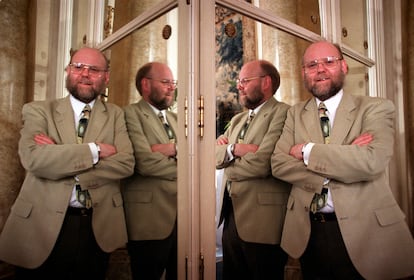Ian Wilmut, a British scientist who led the team that cloned Dolly the Sheep, dies at age 79
Wilmut set off a global discussion about the ethics of cloning when he announced that his team at Roslin had cloned Dolly using the nucleus of a cell from an adult sheep

Ian Wilmut, the cloning pioneer whose work was critical to the creation of Dolly the Sheep in 1996, has died at age 79. The University of Edinburgh in Scotland said Wilmut died Sunday after a long illness with Parkinson’s disease.
Wilmut set off a global discussion about the ethics of cloning when he announced that his team at the university’s Roslin Institute for animal biosciences had cloned a lamb using the nucleus of a cell from an adult sheep.
Initially referred to as “6LL3″ in the academic paper describing the work, the lamb was later named Dolly, after the singer Dolly Parton. The lamb’s cloning was the first time scientists were able to coax a mature adult cell into behaving like a cell from a newly fertilized embryo in order to create a genetically identical animal.
While Dolly’s creation was heralded as a revolution by some scientists, it unnerved many, with critics calling such experiments unethical.
The year after Dolly’s creation, U.S. President Bill Clinton imposed a ban on the use of federal funds for human cloning but stopped short of banning all cloning research.
Dolly’s creation prompted other scientists to clone animals including dogs, cats, horses, and bulls. Dolly also spurred questions about the potential cloning of humans and extinct species. In recent years, scientists have proposed bringing back the woolly mammoth by using a mix of gene editing and cloning.
Dolly’s creation was part of a broader project by scientists to create genetically modified sheep that could produce therapeutic proteins in their milk. About six years after Dolly’s birth, it was euthanized by scientists after she developed an incurable lung tumor.
Wilmut, a trained embryologist, later focused on using cloning techniques to make stem cells that could be used in regenerative medicine. His work was critical to research that aims to treat genetic and degenerative diseases by helping the body repair damaged tissue.
The Roslin Institute said Wilmut was knighted in 2008 and retired from the university in 2012. He later researched Parkinson’s disease after he was diagnosed with the condition, it said.
“We are deeply saddened to hear of the passing of Sir Ian Wilmut,” Bruce Whitelaw, the institute’s director, said in a statement Monday. Whitelaw described Wilmut as a “titan” of science and said his work in Dolly’s creation transformed scientific thinking at the time.
He said the legacy of Wilmut’s work in cloning Dolly continues to be seen.
“This breakthrough continues to fuel many of the advances that have been made in the field of regenerative medicine that we see today,” he said.
Wilmut is survived by his wife, three children and five grandchildren, the University of Edinburgh said. Funeral arrangements have not yet been announced.
Sign up for our weekly newsletter to get more English-language news coverage from EL PAÍS USA Edition
Tu suscripción se está usando en otro dispositivo
¿Quieres añadir otro usuario a tu suscripción?
Si continúas leyendo en este dispositivo, no se podrá leer en el otro.
FlechaTu suscripción se está usando en otro dispositivo y solo puedes acceder a EL PAÍS desde un dispositivo a la vez.
Si quieres compartir tu cuenta, cambia tu suscripción a la modalidad Premium, así podrás añadir otro usuario. Cada uno accederá con su propia cuenta de email, lo que os permitirá personalizar vuestra experiencia en EL PAÍS.
¿Tienes una suscripción de empresa? Accede aquí para contratar más cuentas.
En el caso de no saber quién está usando tu cuenta, te recomendamos cambiar tu contraseña aquí.
Si decides continuar compartiendo tu cuenta, este mensaje se mostrará en tu dispositivo y en el de la otra persona que está usando tu cuenta de forma indefinida, afectando a tu experiencia de lectura. Puedes consultar aquí los términos y condiciones de la suscripción digital.








































